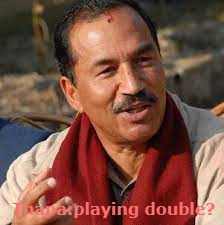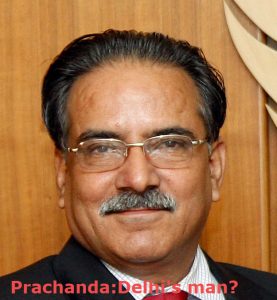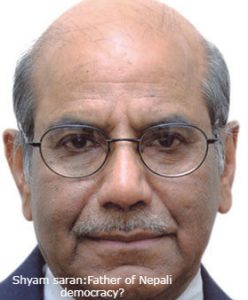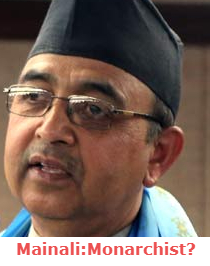N. P. Upadhyaya
Kathmandu: Kamal Thapa is the head of a political conglomerate, the RPP-Rastriya Prajatantra Party, which houses almost the entire stalwarts of the former Panchayat System who in their own way contributed to the unceremonious fall of the regime then led “actively” by the King Birendra and inherited by his brother King Gyanendra.
King Birendra was killed in a mysterious manner. The Royal Palace massacre is still shrouded in mystery.
The one-man rule of the RPP led by Mr. Thapa is being timely challenged by his own party colleague Mr. Rajendra Lingden-an energetic youth from Jhapa district.
Mr. Lingden doesn’t hide his preferences for the comeback of the Nepali Royalty that had been unceremoniously sacked by a regime that had just taken over the Nepali politics dominated excessively by those who “were” the declared “agents” of the traditional Neighbour-India.
As international relations expert from Pakistan, Manzoor Nazeer, writes in his article on Nepal that “for” each and every political change in Nepal, the unwanted presence associated with abundant coercion of the Indian establishment remains.
Manzoor Nazeer, Assistant Professor in the department of Politics & International Relations,in Islamabad, Pakistan emphatically claims in his fresh article on Nepal published in the telegraphnepal.com that, “In several cases, India used coercive means, through indirect intervention in Nepalese affairs or supporting proxies etc. to force rulers in Kathmandu to conclude these treaties and extract concessions.
Such tactics were used for regime change and to bring into power pro-India elements in Nepal and then to get concessions from indebted rulers.
India’s interference in Nepalese affairs started soon after it emerged as an independent state after the British departure”.
The Kings of Nepal have had saved Nepal from the continued Indian onslaught on Nepal.
Even the communists of Nepal having nationalistic bend approve this fact openly.
In effect the Kings of Nepal braved the Indian hegemony uninterruptedly during their tenure in the Nepali throne.
We will come to its later.
The 2005-6 political movement that deposed the sitting King Gyanendra from the Nepali throne was, needless to say, masterminded by the Indian establishment and its “paid and posted” proxies in Nepal.
King Gyanendra was surely the victim of the “open and naked” Indian machinations.
Presumed henchman Girija Prasad Koirala and his hangers on scattered in different political parties, called the Seven Party alliance (SPA) vowed to their masters in Delhi while signing the “coercive” Delhi drafted 12-point agreement that they would sack the Nepali King for the perpetual benefit of the Indian regime which had felt and concluded that ” as long as” the King in Nepal remains in the throne, India will have tough time in “securing and ensuring” substantial benefits.
The benefits for India-the regional rouge included Sikkimisation or at least Bhutanise Nepal through the “proxies” in Kathmandu which comprised not only of the India tamed Nepali leaders and India trained Nepali media men but also “some” who had been “exported” to Nepal with the aim of “destabilising Nepal.
Some media men, according to strong rumours in Kathmandu, were sent by Delhi in advance in order to prepare the background for the ouster of King Gyanendra.
Rumors have it now that the same “Delhi exported” media man is lobbying in Delhi for the reinstatement of the King who was dismissed through his own “dirty and ugly” machinations, if he recalls his horrid past.
Thanks he has returned back to Kathmandu, say those who know his double play.
Back to the main story.
The RPP has now its General Assembly which is expected to choose a new Chairman for the party in a day or two.
Rajendra Lingden has, as already stated, challenged Kamal Thapa’s Chairmanship.
Lingden now claims that if he gets elected as the party Chairman would determinedly act in favour of the “early restoration” of the now defunct monarchy.
Thapa though a monarchist at times plays double with the former Royal Palace.
However, Lingden is straight forward political persona and has opined that the “entire ailment” that have gripped the nation is all due to the absence of the institution of the Nepali monarchy.
Speaking at the inaugural session of the RPP assembly Wednesday, a veteran Communist leader of Nepal, Chandra Prakash Mainali (nick named CP) stunned the audiences in the hall when he bluntly asserted that “Had King Mahendra not been in throne of Nepal, the country would have already gulped by the Indian regime”.
Late King Mahendra was the father of King Birendra and King Gyanendra.

Mainali said, ” Nepal would have met with the fate either of Sikkim or least made Bhutan-the Indian protectorate had not been King Mahendra in the throne”.
“King Mahendra in the mid-sixties through his subtle diplomacy saved Nepal from being an Indian State or least an Indian protectorate of the sort of what Bhutan is today”, Mainali claimed.
It was King Mahendra who in order to lessen the Indian domination in Nepali politics, expanded Nepal’s ties with China and Pakistan-the two known and declared rivals of India.
King Mahendra in fact made known Nepal to the outside world.
Listening to Mainali’s outbursts in favour of the Nepali monarchy more so in favour of late King Mahendra, Prachanda-the declared Delhi’s man (?) became suddenly “restive” and felt uneasy which was only but natural.

When it was his turn to address the RPP gathering, Prachanda cut a joke at Communist Mainali by stating that “Mainali is eying for the post of the RPP Chairman”.
Yet Prachanda said that on the issue of nationalism, his party –the Maoists finds close to the RPP.
Prachanda’s “people’s war that he led was in effect “hatched, designed, funded, executed and guided” by the Indian regime.
Some say that India made Prachanda its “handy tool-proxy” to destabilise and keep Nepal and its sitting monarch ever in a state of flux so that the Nepali State machinery have had to seek Indian “support” to get out from the continued political volatility.
And this is what the International Relations expert from Pakistan, Manzoor, forcefully asserts in his voluminous article on Nepal.
CP Mainali told the jam packed RPP congregation that “after the India designed victory of Prachanda in 2005-6, the country also imported full-fledged foreign intervention that prevails even as of today”.
Mainali stated in an implied manner that since the calculated advent of Prachanda in Nepali politics, the Indian intervention too have had trebled.
To recall, most of the political parties now operating in Nepal run under the “instructions and orders” from their New Delhi’s masters.
Former Indian Ambassador to Nepal Ranjit Rey in his freshly published book openly said that “Nepal’s Home Minister BImlendra Nidhi as Home Minister had approached him to choose an India preferred name for the high post of the Nepal Police.
Just a word of Shame if the former Indian Ambassador spoke correct.
Needless to say, the posted and paid men of India inside the Hall must have “informed” their boss in Delhi as to how CP Mainali exposed India and its proxies in Nepali politics.
Supplying of information gets paid by the RAW branch office in Kathmandu, it is believed.
The veteran communist, CP Mainali, stole the RPP show Wednesday when be made forceful comments made in favour of the Nepali monarchy.
Mainali’s contention was that “had late King Mahendra” not been sensible for the preservation of the Nepali “nationalism and sovereignty”, Nepal would have been already annexed by the regional scoundrel India and made a State of the Indian Union much the same way the once sovereign and independent Sikkim was swallowed by the Indian Union through the use and overuse of its “paid and posted” proxies in Sikkim.
Kaji Lendhu Dorje was a Sikkimi national who sold his motherland against some political favors from Mrs. Indira Gandhi-the lady who was killed by her own “security guard” Beant Singh in a broad day light in Delhi in the year 1984.
Traitor, as the Sikkimese call Kaji lendhup Dorje, died an unsung death.
Not even a single drop of tear was shed by the Indian-Sikkimese when the “traitor” died.
The interesting part of the entire RPP assembly is that those who spoke at the inaugural session of the party lauded the “nationalist persona”of the Kings of Nepal.
Should this mean that the defunct monarchy is about to revive. Keep fingers crossed.
The veteran communist who lauded the Nepal King’s role in the preservation of Nepal’s uniqueness and kept intact the Nepali sovereignty is himself “close” to a third grade Indian communist “Sita Ram Yechury”.
Should this again mean that the communists of Nepal now have begun thinking on how to restore the dumped Nepali Monarchy?
The thug Indian communist leader Yechury too had openly assisted Shyam Saran-the then Indian Foreign Secretary in dismantling the institution of Nepali monarchy.

Some political leaders in Nepal take “Shyam Saran” as father of Nepal’s Republican order.
That’s all.

